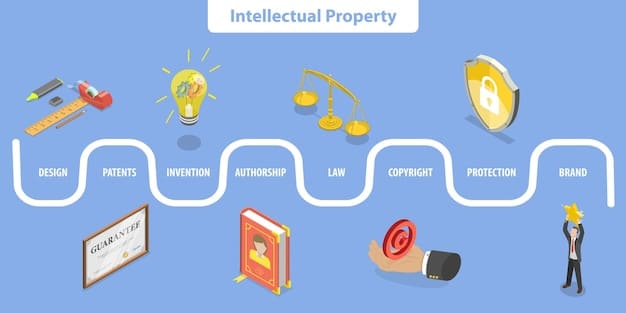Decoding Small Business Loans: 7(a) Program Changes in the US

New Regulations for Small Business Loans: How Will the 7(a) Program Change in the Next 3 Months? This article explores upcoming adjustments to the SBA’s 7(a) loan program, focusing on eligibility, terms, and how these changes will impact small business financing in the United States.
The landscape of small business financing is constantly evolving, and recent changes to the SBA’s 7(a) loan program are poised to significantly impact American entrepreneurs. Understanding New Regulations for Small Business Loans: How Will the 7(a) Program Change in the Next 3 Months? is crucial for businesses looking to secure funding for growth, operations, or recovery. This guide will explore the upcoming changes, what they mean for borrowers, and how to prepare.
Small businesses are the backbone of the US economy, and access to capital is paramount for their survival and success. Let’s delve into the specifics of New Regulations for Small Business Loans: How Will the 7(a) Program Change in the Next 3 Months, ensuring your business is ready to navigate these shifts and capitalize on available opportunities.
Understanding the SBA 7(a) Loan Program
The SBA 7(a) loan program is a popular option for small businesses seeking financing. It offers government-backed guarantees, making it easier for businesses to secure loans from participating lenders. Before diving into New Regulations for Small Business Loans: How Will the 7(a) Program Change in the Next 3 Months, let’s establish a baseline understanding of the program itself.
Key Features of the 7(a) Loan Program
The 7(a) loan program provides financial assistance for a wide range of business purposes, including working capital, equipment purchases, real estate acquisition, and debt refinancing. The SBA doesn’t directly lend money; instead, it guarantees a portion of the loan, reducing the risk for lenders and encouraging them to lend to small businesses.
- Loan amounts can reach up to $5 million, providing substantial capital for significant business investments.
- Loan maturities can range from 7 to 25 years, depending on the use of the funds, offering flexible repayment terms.
- Interest rates are typically negotiated between the borrower and the lender, subject to SBA guidelines.
- The guarantee percentage can vary, but often covers a significant portion of the loan amount, minimizing the lender’s exposure to loss.
Understanding these core features is crucial for any business considering applying for a 7(a) loan and preparing for New Regulations for Small Business Loans: How Will the 7(a) Program Change in the Next 3 Months.

Anticipated Changes to Eligibility Requirements
One of the most significant aspects of New Regulations for Small Business Loans: How Will the 7(a) Program Change in the Next 3 Months? concerns eligibility requirements. These changes could broaden or restrict access to the program, depending on their specifics. Therefore, understanding the potential shifts is vital for business owners.
Several factors are commonly considered when determining eligibility for a 7(a) loan, including:
- Business size: The SBA typically uses employee numbers or annual revenue to define small businesses. These thresholds may be adjusted under the new regulations.
- Creditworthiness: Lenders assess the borrower’s credit history, financial statements, and ability to repay the loan. Changes might involve stricter credit score requirements or altered debt-to-income ratio assessments.
- Industry restrictions: Certain industries may be ineligible or face additional scrutiny. New regulations could modify these restrictions, opening doors for some sectors while closing them for others.
- Personal guarantees: Lenders often require personal guarantees from business owners, making them personally liable for the loan. The extent and conditions of these guarantees could also be subject to change.
Staying informed about these potential changes and consulting with financial advisors will help businesses navigate New Regulations for Small Business Loans: How Will the 7(a) Program Change in the Next 3 Months? effectively.
Potential Impacts on Loan Terms and Conditions
Beyond eligibility, New Regulations for Small Business Loans: How Will the 7(a) Program Change in the Next 3 Months? could also influence the terms and conditions of 7(a) loans. These changes could affect the cost of borrowing, repayment schedules, and other critical aspects of the loan agreement.
Possible Adjustments to Interest Rates
Interest rates on 7(a) loans are subject to SBA guidelines, but lenders have some flexibility in setting them. New regulations might introduce caps or floors on interest rates, potentially making loans more affordable or, conversely, less attractive to lenders. Businesses should monitor these adjustments closely, considering their impact on overall borrowing costs.
The maturity of the loan is another area that could see changes. Longer maturities mean lower monthly payments but higher overall interest costs. New regulations might adjust the maximum or minimum loan terms allowed under the 7(a) program, influencing repayment strategies and long-term financial planning.
Fees and Charges
Lenders often charge various fees associated with 7(a) loans, such as origination fees, servicing fees, and prepayment penalties. New regulations might regulate these fees, aiming to reduce the burden on borrowers and promote transparency. Understanding these potential changes is crucial for businesses to accurately assess the true cost of borrowing under the 7(a) program and prepare for New Regulations for Small Business Loans: How Will the 7(a) Program Change in the Next 3 Months?.
Consider the potential impacts of loan guarantees, as the SBA guarantees a percentage of the loan to lenders, reducing their risk. New regulations might alter the guarantee percentage, affecting the lender’s willingness to approve loans and the terms offered to borrowers. Businesses should carefully evaluate how these changes align with their financial needs and risk tolerance to best utilize this evolving landscape.

Strategies for Small Businesses to Adapt
Given the anticipated New Regulations for Small Business Loans: How Will the 7(a) Program Change in the Next 3 Months?, small businesses should proactively adopt strategies to adapt and thrive. Preparation and informed decision-making are essential for navigating these changes successfully.
- Stay informed: Monitor updates from the SBA, industry associations, and financial news sources to stay abreast of the latest developments.
- Review financial statements: Ensure your financial records are accurate and up-to-date. Lenders will scrutinize these documents closely when evaluating loan applications.
- Improve credit score: Focus on improving your business and personal credit scores. A higher credit score increases your chances of loan approval and favorable terms.
- Develop a business plan: Create a detailed business plan that outlines your goals, strategies, and financial projections. A well-prepared plan demonstrates your seriousness and increases lender confidence.
By proactively adapting and staying informed about New Regulations for Small Business Loans: How Will the 7(a) Program Change in the Next 3 Months?, small businesses can position themselves for success in securing the funding they need.
Seeking Expert Guidance and Support
Navigating the complexities of New Regulations for Small Business Loans: How Will the 7(a) Program Change in the Next 3 Months? can be challenging. Seeking expert guidance and support from financial advisors and business consultants can be invaluable.
The Value of Financial Advisors
Financial advisors can provide personalized advice based on your specific circumstances. They can help you assess your eligibility for 7(a) loans, evaluate different loan options, and develop a financial plan that aligns with your goals. Their expertise ensures you’re well-prepared to make informed decisions.
Business consultants can offer strategic advice on how to adapt your business operations to New Regulations for Small Business Loans: How Will the 7(a) Program Change in the Next 3 Months? They can help you identify growth opportunities, improve efficiency, and develop a resilient business model. Their insights can be critical for long-term success.
Consider the resources provided by the SBA and local business development centers, as these organization offer free or low-cost counseling, training, and resources for small businesses. They can help you navigate the application process, understand your rights and responsibilities, and connect with relevant resources. By seeking expert guidance and support, small businesses can confidently navigate New Regulations for Small Business Loans: How Will the 7(a) Program Change in the Next 3 Months? and achieve their financial objectives.
Long-Term Implications for Small Business Growth
The anticipated New Regulations for Small Business Loans: How Will the 7(a) Program Change in the Next 3 Months? have significant long-term implications for small business growth in the US. The changes could reshape the landscape of small business financing, impacting access to capital, investment decisions, and overall economic development.
Changes to eligibility and loan terms can significantly influence access to capital for small businesses. Looser eligibility requirements and favorable loan terms could encourage more businesses to seek funding, stimulating growth and innovation. If eligibility requirements become more stringent or loan terms become less attractive, it could stifle investment and slow down economic activity so preparation for New Regulations for Small Business Loans: How Will the 7(a) Program Change in the Next 3 Months? will be vital.
The changes may ripple through the American economy, as changes to the 7(a) loan program could impact job creation, innovation, and regional development. Increased access to capital could enable small businesses to hire more employees, invest in new technologies, and expand into new markets. However, reduced access to funding could hinder growth and limit opportunities for advancement so consider the potential impacts of New Regulations for Small Business Loans: How Will the 7(a) Program Change in the Next 3 Months?. By understanding these potential long-term implications, policymakers, business leaders, and entrepreneurs can work together to foster a vibrant and inclusive small business ecosystem.
| Key Point | Brief Description |
|---|---|
| 💰 Eligibility Changes | Potential adjustments to size standards and creditworthiness criteria. |
| 📊 Loan Terms | Possible modifications to interest rates, maturities, and fees. |
| 🛡️ Adaptation Strategies | Stay informed, review financials, and seek expert guidance. |
Frequently Asked Questions
The new regulations primarily aim to modernize the 7(a) program, improve access for underserved communities, and ensure responsible lending practices. These changes could impact eligibility and loan terms.
Start by reviewing your financial statements and credit score. Develop a strong business plan, and consult with a financial advisor to understand how the changes may affect your loan options.
Typically, new regulations primarily impact new loan applications. However, it’s wise to confirm with your lender if any changes could affect your existing loan terms or conditions.
The SBA website (www.sba.gov) is the official source for the latest information and updates on the 7(a) loan program, including any new regulations or guidelines.
You can reach out to SBA-approved lenders, financial advisors, or business consultants specializing in small business financing. They can provide personalized guidance based on your specific needs.
Conclusion
Understanding New Regulations for Small Business Loans: How Will the 7(a) Program Change in the Next 3 Months? is essential for small businesses seeking financing in the US. By staying informed, adapting proactively, and seeking expert guidance, businesses can navigate these changes successfully.
The SBA 7(a) loan program remains a valuable resource for small businesses, and adapting to these changes is the key to unlocking continued growth and prosperity. Stay ahead of the curve and position your business for long-term success.





